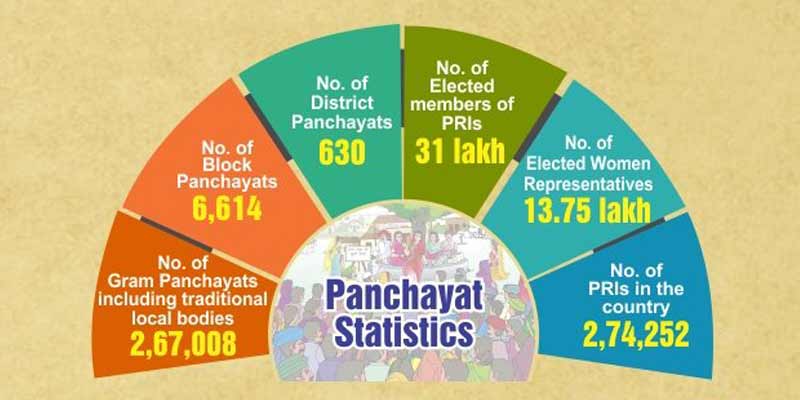- India
- Sep 19
- Mathew Gregory
Functioning of Panchayati Raj Institutions
Panchayati Raj functions as a system of governance in which gram panchayats are the basic units of local administration. The system has three levels: Gram Panchayat (village level), Mandal Parishad or Block Samiti or Panchayat Samiti (block level), and Zila Parishad (district level). It was formalized in 1992 by the 73rd amendment to the Indian Constitution. The Constitution envisages for Panchayats to function as institutions of self-government and prepare plans and implement schemes for economic development and social justice.
Accordingly, Ministry of Panchayati Raj (MoPR) seeks to make Panchayati Raj Institutions (PRIs) an effective, efficient and transparent vehicle for local governance, social change and public service delivery mechanism meeting the aspirations of local population through policy interventions, advocacy, capacity building, persuasion and financial support.
The Panchayats receive funds from three sources
1. Local body grants, as recommended by the Central Finance Commission
2. Funds for implementation of centrally sponsored schemes
3. Funds released by the state governments on the recommendations of the State Finance Commissions
Steps taken to boost PRIs
• To strengthen functioning of PRIs across the country, MoPR has launched eGramSwaraj (https://egramswaraj.gov.in), a user friendly web-based portal, which aims to bring in better transparency in the decentralised planning, progress reporting, financial management, work-based accounting and details of assets created.
• Further, for ensuring timely audit of Panchayat accounts i.e. receipts and expenditures of Gram Panchayats, MoPR has rolled out an online application – AuditOnline (https://auditonline.gov.in) which not only facilitates the auditing of Panchayat accounts but also provides for maintaining of audit records.
• This application streamlines the process for audit inquiries, draft local audit reports, draft audit-paras etc. and thus ensures proper maintenance of accounts by Panchayats to improve transparency and accountability.
• MoPR has been providing programmatic support for strengthening of PRIs and capacity building of Elected Representatives and functionaries of PRIs to improve their functioning and effectiveness and make them self reliant.
• These programs are specifically focused on addressing the critical gaps that constrain the functioning of Panchayats, facilitating democratic planning and decision making through People’s participation, and strengthening the institutional structure of Panchayats.
• Further, the Government has launched the core Centrally Sponsored Scheme (CSS) of Rashtriya Gram Swaraj Abhiyan (RGSA),which is being implemented from 2018-19 to 2021-22, with the primary aim of developing governance capabilities of PRIs to deliver on Sustainable Development Goals (SDGs).
• Article 280 (3) (bb) of the Constitution provides for the Finance Commission to make recommendations regarding the measures needed to augment the Consolidated Fund of a State to supplement the resources of the Panchayats in the State on the basis of the recommendations made by the Finance Commission of the State.
• Accordingly, to improve the functioning of Panchayati Raj Institutions under the Fourteenth Finance Commission award, grants to the tune of Rs. 1,80,237 crore were released for the Gram Panchayats in 26 states for the period 2015 to 2020.
• For the period FY 2020-21, the Fifteenth Finance Commission has awarded grant of Rs. 60,750 crore, for Rural Local Bodies (RLBs) in 28 states which has been the highest annual Finance Commission allocation for the RLBs so far.
• MoPR has been taking several steps to strengthen the Panchayati Raj Institutions in the States and Union Territories covered under Part IX of the Constitution through provisioning of financial and technical assistance.
• The various measures taken include incentivizing the States which
◦ have devolved more functions, funds and functionaries to Panchayats,
◦ providing financial and technical assistance for capacity building of Panchayats to enable them to perform the devolved functions effectively and efficiently,
◦ strengthening systems of budgeting, accounting and auditing,
◦ development of software applications and imparting training for their use to bring in transparency, accountability and efficiency in their functioning, - incentive awards to the selected best performing Panchayats and assisting the States in formulation of detailed guidelines for preparation of participatory Gram Panchayat Development Plans by the Gram Panchayats utilising the resources available at their command.
(The author is a trainer for Civil Services aspirants. The views expressed here are personal.)

